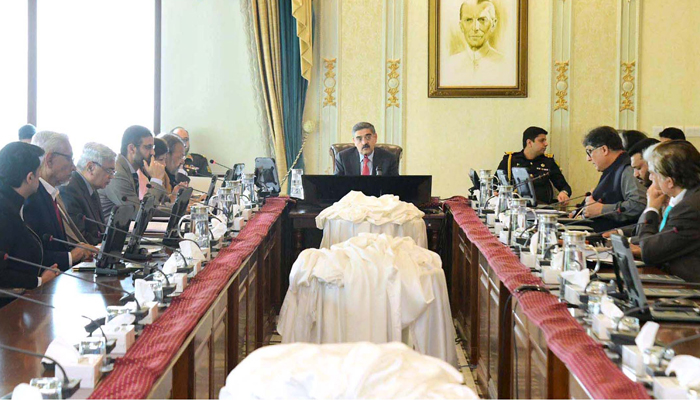Cabinet rejects plan to reduce Rs589bn loss estimated to be incurred by Discos in FY24
Cabinet argued that these steps were diversions from real sustainable solutions a senior official of Energy Ministry told The News
ISLAMABAD: The federal cabinet, in a meeting held in the first week of January, rejected a Power Division plan to substantially reduce the Rs589 billion loss estimated to be incurred by the distribution companies (Discos) in the current fiscal year, by blocking the passports and CNICs and stopping defaulters from travelling abroad.
The cabinet argued that these steps were diversions from the real sustainable solutions, a senior official of the Energy Ministry told The News.
“The cabinet also disapproved a proposal seeking the appointment of a serving military officer equal to the rank of brigadier as head of the Performance Monitoring Unit (PMU) in each distribution company, comprising officers from the Pakistan Administrative Service (PAS), FIA and an intelligence agency, to reduce the losses and electricity theft and nab unscrupulous officials.”
Disagreeing with the proposal worked out by the Power Division, the cabinet argued that rather than disturbing the functional bureaucracy and the armed forces, which had more important work to do, there was a need for the Power Division to build its in-house teams to monitor the affairs of distribution companies.
“A cabinet member observed that there was no quick solution to this long-standing issue and proposed that an arrangement under the PMU would only yield an optical illusion, as well as legal and political long-term complications.”
The Power Division has been directed to come up with a proper plan, with clear timelines and an exit strategy from the economic morass the Discos were in.
“Prime Minister Anwar-ul-Haq Kakar also expressed dissatisfaction with the poor performance of Discos and directed the Power Division to submit a comprehensive plan with clear targets, responsibilities and timelines,” said the official.
After the unbundling of Wapda, the power distribution business had been entrusted to 10 distribution companies (excluding Karachi, which was being served by a private company), and since then, the appointment of suitable persons as chief executive officers (CEOs) in these distribution companies had always been a challenge for the government. The circular debt has piled up to the tune of Rs.2.75 trillion as of mid-November 2023. The receivables of distribution companies have also piled up to the tune of Rs1.786 trillion, making the sector unsustainable.
-
 Google Disrupts Chinese-linked Hacking Groups Behind Global Cyber Attacks
Google Disrupts Chinese-linked Hacking Groups Behind Global Cyber Attacks -
 Four People Killed In Stabbing Rampage At Washington Home
Four People Killed In Stabbing Rampage At Washington Home -
 Meghan Pushes Prince Harry Into Territory That’s Dangerous To His Brand: ‘She Isn’t Hearing A Word Of It’
Meghan Pushes Prince Harry Into Territory That’s Dangerous To His Brand: ‘She Isn’t Hearing A Word Of It’ -
 Christina Applegate Reflects On Lasting Impact Of Being Molested In Childhood
Christina Applegate Reflects On Lasting Impact Of Being Molested In Childhood -
 Martin Short Makes Big Decision Following Tragic Death Of Daughter
Martin Short Makes Big Decision Following Tragic Death Of Daughter -
 Antarctica’s Mysterious ‘gravity Hole’: What’s Behind The Evolution Of Earth’s Deep Interior?
Antarctica’s Mysterious ‘gravity Hole’: What’s Behind The Evolution Of Earth’s Deep Interior? -
 Hilary Duff Addresses Ashley Tisdale's 'toxic Mom Group' Claims And Matthew Koma's Firey Response
Hilary Duff Addresses Ashley Tisdale's 'toxic Mom Group' Claims And Matthew Koma's Firey Response -
 Jack Hughes's Proximity To Trump Angers Tate McRae Fans
Jack Hughes's Proximity To Trump Angers Tate McRae Fans -
 Neve Campbell Opens Up About Her 'difficult Decision' To Not Sign 'Scream 6'
Neve Campbell Opens Up About Her 'difficult Decision' To Not Sign 'Scream 6' -
 Nobel-winning Scientist Resigns From Columbia University After Epstein Links Revealed
Nobel-winning Scientist Resigns From Columbia University After Epstein Links Revealed -
 Prince William Remarks At BAFTAs 'indicative' Of King Charles Physical, Mental Health Too
Prince William Remarks At BAFTAs 'indicative' Of King Charles Physical, Mental Health Too -
 Kanye West's Last Measure To Save Bianca Censori Marriage As He Tries To Salvage Image
Kanye West's Last Measure To Save Bianca Censori Marriage As He Tries To Salvage Image -
 Kim Kardashian Finally Takes 'clear Stand' On Meghan Markle, Prince Harry
Kim Kardashian Finally Takes 'clear Stand' On Meghan Markle, Prince Harry -
 Christina Applegate Makes Rare Confession About What Inspires Her To Keep Going In Life
Christina Applegate Makes Rare Confession About What Inspires Her To Keep Going In Life -
 Patrick J. Adams Shares The Moment That Changed His Life
Patrick J. Adams Shares The Moment That Changed His Life -
 Selena Gomez Getting Divorce From Benny Blanco Over His Unhygienic Antics?
Selena Gomez Getting Divorce From Benny Blanco Over His Unhygienic Antics?




